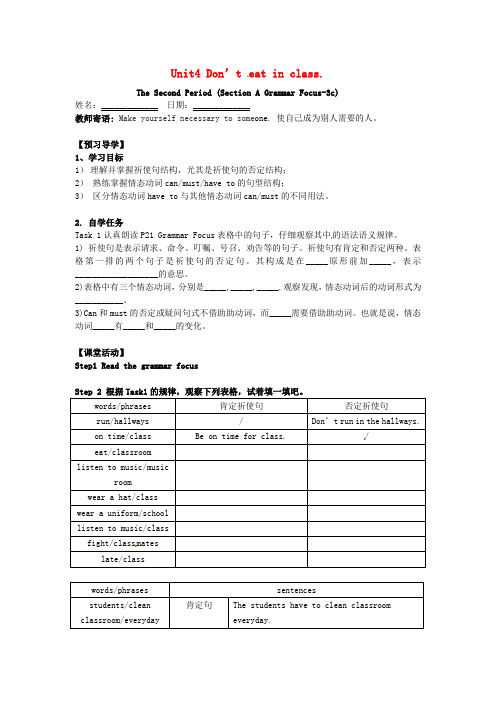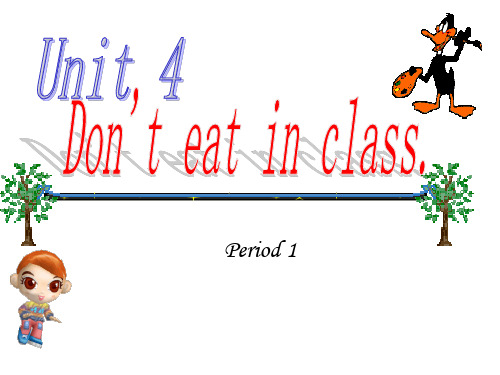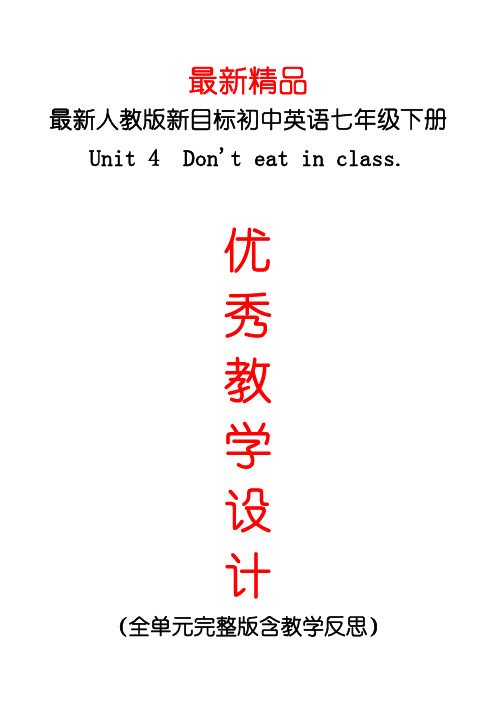七年级英语下Unit4_Don’t_eat_in_class_section_A_Period_2
- 格式:ppt
- 大小:4.77 MB
- 文档页数:64



Unit4 Don’t eat in class.The Second Period (Section A Grammar Focus-3c)姓名:_____________ 日期:_____________教师寄语: Make yourself necessary to some one. 使自己成为别人需要的人。
【预习导学】1、学习目标1)理解并掌握祈使句结构,尤其是祈使句的否定结构;2)熟练掌握情态动词can/must/have to的句型结构;3)区分情态动词have to与其他情态动词can/must的不同用法。
2. 自学任务Task 1认真朗读P21 Grammar Focus表格中的句子,仔细观察其中的语法语义规律。
1) 祈使句是表示请求、命令、叮嘱、号召、劝告等的句子。
祈使句有肯定和否定两种。
表格第一排的两个句子是祈使句的否定句。
其构成是在_____原形前加_____,表示___________________的意思。
2)表格中有三个情态动词,分别是_____,_____,_____.观察发现,情态动词后的动词形式为___________。
3)Can和must的否定或疑问句式不借助助动词,而_____需要借助助动词。
也就是说,情态动词_____有_____和_____的变化。
【课堂活动】Step1 Read the grammar focusStep 2 根据Task1的规律,观察下列表格,试着填一填吧。
words/phrases 肯定祈使句否定祈使句run/hallways / Don’t run in the hallways.on time/class Be on time for class. /eat/classroomlisten to music/musicroomwear a hat/classwear a uniform/schoollisten to music/classfight/class mateslate/classwords/phrases sentencesstudents/clean classroom/everyday 肯定句The students have to clean classroom everyday.一般疑问句Do the students have to clean classroomeveryday?she/be at home/at 5:00 肯定句一般疑问句she/do morning reading/everyday肯定句一般疑问句he/wear a uniform/atschool肯定句一般疑问句we/be quiet/in thelibrary肯定句一般疑问句Step 3 Activity 3aWrite the rules for the school library.Samples: T: Can we talk loudly in the library? /What can’t students do in 3a.Step4 Activity 3bUse the words to make questions about the rules. Then write answers according to your school.Step5 Activity 3c (group-work)Make up five cool rules for your dream school. Share your rules wit h your group members. Then make a report.Sample: At my dream school, We don’t have to school everyday. We don’t have to wear uniform everyday. We can eat in class. We can buy food from outside. And we must love our school.【训练反馈】Ⅰ.汉译英。

Unit 4 Don’t eat in class.Section A 2a—2d ( P20 )* 教师寄语:No rules, no standards. 没有规矩,不成方圆。
【学习目标】【学习重点】:1、学习掌握本节课的生词和短语;2、巩固祈使句的用法;3、学习情态动词can表示许可的肯定句、否定句、一般疑问句及肯定、否定回答。
4、提高学生的听说能力。
【体验学习】:I、预习交流1. 根据音标拼读单词并牢记;2. 自学课文,勾画出重点和疑惑。
II、翻译官1. eat outside ________________2. wear a hat ___________________3. a lot of ___________________4. be late for class_______________5. 不得不__________________6. 穿校服_____________________7. 保持安静________________【课堂导学】:I、新课呈现Step1 RevisionReview the school rules at P19.Step2 PresentationPresent key sentences in this period.This is a great school, but there are a lot of rules.Can we bring music players to school?And we always have to wear the school uniform.And we also have to be quiet in the library.Step3 ListeningListen and finish 2a and 2b. Check the answers.Step4 Pair workTalk about the rules in 2a.Step5 Role-playRole-play the conversation in 2d.II、合作交流Group work: 分析总结情态动词can的用法,并练习造句。


Unit 4 Don't eat in class.Section A (1a-2d)一、教学目标:1. 语言知识目标:1) 能掌握以下单词:rules, arrive, late, hall, dinning hall, listen, listen to, fight, sorry2) 能掌握以下句型:①Don't eat in class.②You must be on time.③Eat in the dining hall.2. 学会用英语表达一些标志的含义。
3. 熟练使用目标语言谈论对某些规章制度(校规、家规等)的看法3. 情感态度价值观目标:能用英语表达和制定一些简单的规则,理解没有规矩不成方圆;无论是在学校时还是在家庭中以及以后走上社会都应当遵守规则,按规则办事。
二、教学重难点1. 教学重点:1) 肯定祈使句是省略掉主语的原形动词开头;2) 否定祈使句则是在肯定祈使句前加上“don’t”。
3) 情态动词must及have to在用法上的区别。
2. 教学难点:掌握祈使句的用法,并能听懂、会说一些简单的祈使句。
三、教学过程Ⅰ. Warming-up and revision教师进教室后,使用祈使句请学生们完成一系列动作:Please stand up/ sit down. Close the door, please. Look at me and listen to me.Don’t open your books. Don’t talk. Let’s begin our class.学生听教师的指令完成各种动作,教师也可将指令写到黑板上,让学生从视觉上考察祈使句的特点。
Ⅱ. Presentation教师出示书上1a 的图片,向学生提问。
指着图上奔跑的男孩提问T:What’s the boy doing? S: He’s running.T: Where is he running? S: He’s running in the hallways.(板书,教读)T:Can you run in the hallways? S: No, I can’t.T: So please don’t run in the hallways.(板书,教读)(= You can’t run in the hallways.)学生跟读数遍,明白祈使句和“can”的表达含意。
Unit 4 Don’t eat in class.Section A₁ (1a—2b)I. 根据句意及图片提示填写单词1. English is an i _______ subject. We have to learn it well.2. My books are in my room. Can you b _______ them here?3. We have to w _______ our school uniforms every day.4. Don’t stand o _______. Come in, please!5. We must be q _______ in the library.6. I’m s ________ to be late for class again.II. 用适当的介词填空1. He sleeps late, so he arrives late _______ class.2. Everyone should listen ______ the teacher ______class.3. We can eat _______ the dining hall, but we can’t eat ______ the classroom or hallways.4. There are a lot ______ rulers in our school.5. Can I bring my music player _______ school?III.用所给单词的适当形式填空1. ______ (not be) late for the meeting, please.2 She _______ (have) to _______(wear) a hat.3. He has to ______ (arrive) there before ten o’clock.4. It’s my _______ (one) day at school.IV.单项选择( ) 1. —When do you arrive _______ school every day?—_______ eight o’clock.A. at; AtB. in: InC. in; AtD. at: In( ) 2. Annie’s bike is broken(坏的),so she ______ walk to school.A. have toB. has toC. need toD. must( ) 3. —_______ run in the hall ways, Mike.—S orry, I won’t.A. Don’tB. PleaseC. NoD. Not( ) 4. Nick is never late for work. He always gets to the office ______.A. on timeB. in timeC. at timesD. sometimes( ) 5. We can’t eat in the classroom _______ in the hallways.A. andB. orC. butD. so( ) 6. Many teachers don’t like Li Wei because he often _______ for class.A. be lateB. arrive lateC. are lateD. arrives lateIV. 根据汉语意思完成句子1. 不要在课堂上吃东西。
Unit 4 Don’t eat in class.Learning Objectives一、Topics(话题):Rules二、Functions (功能)Talk about rules三、Structures (结构)1. Imperatives (Don’t)2. Can for permission3. Modal verbs have to, must四、Target Language (目标语言)Don’t eat in the classroom!We ca n’t arrive late for class.We must be on time.Can we wear a hat in class?Yes, we can./No, we can’t.We have to clean the classroom.We have to follow the rules.五、V ocabulary (词汇)rule, dish, night, luck, hair, arrive, listen, fight, wear, bring, practice, relax, read, feel, remember, follow, keep, learn, quiet, noisy, dirty, terrible, strictarrive late for class, be on time, listen to music, do the dishes, make your bed, be strict with …, follow the rules六、Skills (技能)Listening for key informationScanning in reading七、Recycling (复习巩固)go out, do your homework, watch TV, clean your room, help your mom make breakfast, in the evening, every Saturday八、教材分析这本教材的词汇量很大,有难度,但是,内容新颖,尤其是生动活泼的卡通化的画面,很符合七年级学生的年龄特点和心理特点,其中还囊括了丰富多彩的文化知识,以及合作探究的活动,十分贴近学生的实际生活经验。
七下英语单元同步练习Unit 4 Don’t eat in classSection A (1a-2d)姓名一、本节重要词组和句型1. arrive late for = be late for2. on time 与in time区别3. in class 与in the class区别4. listen (to) 与hear区别5. dining hall、dining room 和sitting room意思6. have to与must区别7. wear、put 及on dress区别8. take与bring区别9. can 与can’t用法10. arrive at 与arrive in区别二、本节练习题Ⅰ. 翻译出下列短语或句子。
(每小题4分,满分20分)1. 不要在图书馆里讲话2. 上课不要迟到3. 在食堂吃东西4. 我们可以在音乐教室里听音乐5. 我们必须穿校服到学校Ⅱ. 用所给词的适当形式填空。
(每小题4分,满分20分)1. (not be) late for the meeting, please.2. He has to (arrive) there before ten o’clock?3. Tom and his father often (swim) in the afternoon.4. My uncle can’t (drive) a car.5. She (not like) playing basketball. Ⅲ. 根据句意和首字母提示完成单词。
(每小题4分,满分20分)1.We must follow the school r .2. It’s i(重要的) to learn English well.3. The two brothers often f at home, Mom is veryunhappy.4. You must w sports shoes for PE class5. Don’t stand o. Come in, please!Ⅳ. 单项填空。